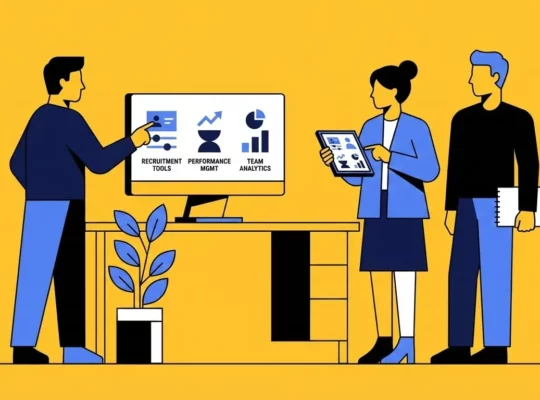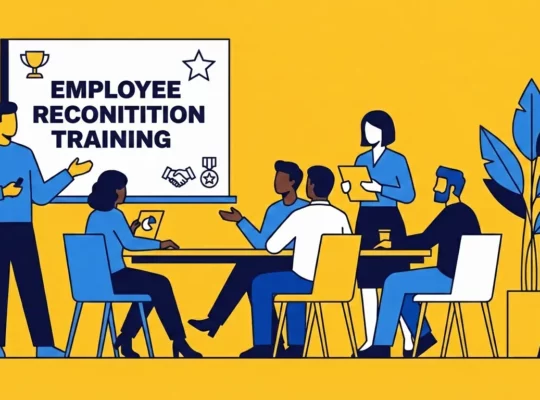Managers today must embrace constant growth to thrive in dynamic workplaces. Implementing growth ideas for managers is essential to fostering high-performing teams, retaining talent, and improving organizational success. Managers focused on continuous learning and self-development are more likely to lead successful teams, resulting in increased productivity and better employee satisfaction. With the rapid pace of change in work environments, managers must prioritize their development to stay ahead. At Review.jobs, embracing these growth ideas not only benefits individual managers but also leads to lasting success for their teams and organizations.
- Building Trust: The Foundation of High-Performing Teams
- Sharpening Communication Skills
- Setting SMART Goals
- Effective Delegation
- Motivating Your Team for Success
- Fostering a Growth Mindset
- Developing Problem-Solving and Decision-Making Skills
- Supporting and Recognizing Employees
- Building Strong Relationships and Collaboration
- Adaptability and Flexibility in Leadership
Building Trust: The Foundation of High-Performing Teams
Trust is the cornerstone of any successful team dynamic. It fosters a positive work environment where employees feel supported, valued, and motivated to perform at their best. When trust is established between managers and team members, engagement and loyalty skyrocket.
To build a culture of trust, managers must:
1. Be Transparent and Reliable
- Follow Through: Consistently deliver on promises and commitments to establish credibility.
- Be Honest: Communicate openly and honestly, even when delivering difficult news.
- Be Accountable: Take responsibility for your actions and mistakes.
2. Foster Open Communication
- Active Listening: Practice active listening to demonstrate that you value your team members’ perspectives.
- Empathy: Show empathy and understanding for your team’s challenges and concerns.
- Create a Safe Space: Encourage open communication by creating a safe environment where employees feel comfortable sharing their thoughts and ideas without fear of judgment.
3. Encourage Feedback
- Seek Input: Actively solicit feedback from your team members on their work, the team’s performance, and the company’s direction.
- Act on Feedback: Demonstrate that you value their input by taking action on their suggestions and feedback.
- Be Open to Criticism: Be receptive to both positive and negative feedback, and use it as an opportunity for growth and improvement.
4. Showcase Integrity in Decision-Making
- Fairness: Make fair and impartial decisions that consider the needs and perspectives of all team members.
- Transparency: Explain the reasoning behind your decisions to build trust and understanding.
- Ethical Behavior: Act with integrity and adhere to ethical principles in all your actions.
Sharpening Communication Skills
Effective communication is the cornerstone of successful leadership. It ensures that goals, expectations, and feedback are conveyed clearly and accurately, leading to smoother workflows, improved team dynamics, and higher productivity.
Actionable Steps to Sharpen Your Communication Skills
1. Practice Active Listening:
- Focus on the Speaker: Give your full attention to the speaker and avoid multitasking.
- Paraphrase and Summarize: Restate the speaker’s main points to ensure understanding.
- Ask Clarifying Questions: If something is unclear, don’t hesitate to ask questions.
2. Set Clear Expectations
- Define Goals: Clearly outline team goals and individual responsibilities.
- Provide Context: Explain how these goals contribute to the broader company objectives.
- Regular Check-Ins: Schedule regular check-ins to ensure everyone is aligned and on track.
3. Master the Art of Feedback
- Give Constructive Feedback: Offer specific, actionable feedback that focuses on behavior and results, not personality traits.
- Seek Feedback: Encourage your team members to provide feedback to you as well.
- Balance Positive and Constructive: Offer both positive reinforcement and constructive criticism to maintain morale and foster growth.
4. Harness the Power of Non-Verbal Communication
- Eye Contact: Maintain eye contact to show engagement and respect.
- Facial Expressions: Use appropriate facial expressions to convey your emotions and understanding.
- Gestures: Use gestures to emphasize points and make your communication more engaging.
- Body Language: Be mindful of your body language, as it can send strong messages.
Setting SMART Goals
SMART goals provide a structured framework for setting and achieving objectives that are Specific, Measurable, Achievable, Relevant, and Time-bound. By following this approach, teams can enhance focus, accountability, and overall productivity.
Actionable Steps for Setting SMART Goals
- Collaborate with Your Team:
- Involve Everyone: Ensure all team members are involved in the goal-setting process. This fosters a sense of ownership and commitment.
- Align Goals: Ensure that individual goals align with the team’s overall objectives and the company’s strategic direction.
- Define SMART Goals:
- Specific: Clearly define what you want to achieve. Avoid vague or ambiguous goals.
- Measurable: Set quantifiable targets that can be tracked and measured.
- Achievable: Ensure that the goals are realistic and attainable given the team’s resources and capabilities.
- Relevant: Align goals with the team’s priorities and the organization’s overall objectives.
- Time-bound: Set specific deadlines to create a sense of urgency and accountability.
- Regularly Review Progress
- Track Progress: Monitor progress towards goals regularly and adjust as needed.
- Celebrate Milestones: Acknowledge and celebrate achievements to maintain motivation and momentum.
- Empower Team Members
- Delegate Responsibilities: Assign clear roles and responsibilities to team members.
- Provide Support: Offer the necessary resources, training, and guidance to help team members achieve their goals.
- Encourage Autonomy: Empower team members to make decisions and take ownership of their work.
Effective Delegation
Delegation is a powerful tool for managers seeking to empower their teams, increase productivity, and foster a positive work environment. By effectively delegating tasks, managers can lighten their workload, develop their team members, and drive organizational success.
Actionable Steps for Effective Delegation
- Assess Team Strengths:
- Identify Talents: Understand the unique skills, strengths, and interests of each team member.
- Match Tasks to Skills: Delegate tasks that align with their abilities to maximize productivity and satisfaction.
- Provide Clear Instructions
- Define Expectations: Clearly communicate the desired outcomes, deadlines, and resources available.
- Offer Guidance: Provide guidance and support without micromanaging. Allow employees to take ownership of their work and develop problem-solving skills.
- Trust Your Team
- Empower Employees: Show your trust by giving team members autonomy and responsibility.
- Provide Feedback: Offer constructive feedback and support to help employees grow and develop.
By effectively delegating tasks, managers can:
- Increase Productivity: Free up their time to focus on strategic initiatives.
- Develop Their Team: Provide opportunities for growth and development.
- Foster a Positive Work Environment: Create a culture of trust, empowerment, and accountability.
Motivating Your Team for Success
A motivated team is a high-performing team. Managers who focus on motivation can create a positive and productive work environment where employees feel valued, engaged, and inspired. Here are some actionable steps to motivate your team:
1. Lead by Example
- Positive Attitude: Maintain a positive and optimistic outlook, even during challenging times.
- Strong Work Ethic: Demonstrate a strong work ethic and commitment to your team’s goals.
- Passion for Your Work: Show genuine enthusiasm for your role and the company’s mission.
2. Recognize and Celebrate Achievements
- Public Recognition: Acknowledge and celebrate team and individual accomplishments publicly to boost morale and inspire others.
- Personalized Incentives: Offer personalized rewards or incentives to recognize outstanding contributions.
- Express Gratitude: Regularly express your appreciation for your team’s hard work and dedication.
3. Provide Regular Feedback
- Constructive Feedback: Offer specific, actionable feedback to help employees improve their performance.
- Regular Check-Ins: Schedule regular one-on-one meetings to discuss progress, goals, and provide support.
- Growth Opportunities: Identify opportunities for professional development and growth to keep employees engaged and motivated.
4. Foster a Positive Work Environment
- Create a Supportive Culture: Encourage collaboration, teamwork, and a sense of belonging.
- Address Concerns: Be responsive to employee concerns and address issues promptly.
- Promote Work-Life Balance: Support a healthy work-life balance to prevent burnout and maintain employee satisfaction.
5. Empower Your Team
- Delegate Responsibilities: Empower employees by delegating tasks and providing autonomy.
- Trust and Confidence: Show trust in your team members and give them the opportunity to succeed.
- Recognize Potential: Identify and nurture the talents and potential of your team members.
Fostering a Growth Mindset
A growth mindset is a powerful tool for leaders and teams. It encourages continuous learning, improvement, and a belief in the ability to develop new skills. By cultivating a growth mindset, you can unlock your team’s full potential and drive long-term success.
Actionable Steps to Foster a Growth Mindset
- Embrace Challenges:
- Encourage Risk-Taking: Encourage your team members to step outside of their comfort zones and take on new challenges.
- Celebrate Failures: View failures as learning opportunities and celebrate the lessons learned.
- Provide Support: Offer support and guidance as team members tackle new challenges.
- Provide Skill Development Opportunities:
- Identify Needs: Regularly assess your team members’ skills and identify areas for development.
- Offer Training: Provide access to training programs, workshops, and conferences to help them acquire new skills.
- Encourage Self-Learning: Foster a culture of self-learning and continuous improvement.
- Cultivate a Culture of Learning
- Promote Experimentation: Encourage a culture of experimentation and exploration.
- Learn from Mistakes: Emphasize that mistakes are natural and can be valuable learning experiences.
- Celebrate Successes: Recognize and celebrate achievements, no matter how small.
Developing Problem-Solving and Decision-Making Skills
Effective problem-solving and decision-making are essential skills for any manager. By developing these abilities, you can navigate challenges, drive innovation, and lead your team to success.
Anticipating Challenges
- Proactive Planning: Develop contingency plans for potential obstacles and challenges.
- Risk Assessment: Regularly assess potential risks and their impact on your team’s goals.
- Stay Informed: Stay updated on industry trends, market changes, and emerging challenges.
Utilizing Problem-Solving Techniques
- Root Cause Analysis: Identify the underlying causes of problems to address them effectively.
- Brainstorming: Encourage creative thinking and generate a variety of potential solutions.
- Decision Trees: Use decision trees to visualize different scenarios and outcomes.
Encouraging Collaborative Problem-Solving
- Involve Your Team: Empower your team members to contribute their ideas and perspectives.
- Facilitate Open Discussions: Create a safe and inclusive environment for open dialogue and debate.
- Leverage Diverse Perspectives: Encourage team members to share their unique viewpoints and experiences.
By developing your problem-solving and decision-making skills, you can:
- Improve Decision Quality: Make more informed and effective decisions.
- Build Team Morale: Empower your team members and foster a sense of ownership.
- Drive Innovation: Encourage creative thinking and problem-solving.
- Navigate Challenges: Effectively address obstacles and overcome adversity.
Supporting and Recognizing Employees
Employee support and recognition are essential for creating a thriving work environment. When employees feel valued, appreciated, and supported, they are more likely to be engaged, productive, and loyal to the organization.
Actionable Steps to Support and Recognize Employees
- Conduct Regular One-on-One Meetings:
- Build Relationships: One-on-one meetings provide an opportunity to build relationships and establish trust with your team members.
- Provide Feedback: Offer constructive feedback and guidance to help employees grow and develop.
- Address Concerns: Create a safe space for employees to share their thoughts, concerns, and ideas.
- Provide Resources and Guidance
- Mentorship: Offer mentorship opportunities to help employees develop skills and advance their careers.
- Training and Development: Invest in training and development programs to support employee growth and development.
- Tools and Resources: Ensure that employees have the necessary tools and resources to succeed in their roles.
- Recognize Achievements
- Public Recognition: Acknowledge and celebrate employee achievements publicly to boost morale and inspire others.
- Personalized Rewards: Offer personalized rewards or incentives to recognize outstanding contributions.
- Express Gratitude: Regularly express your appreciation for your team’s hard work and dedication.
Building Strong Relationships and Collaboration
Strong relationships and collaboration are the foundation of a high-performing team. When team members work together effectively, they can achieve greater results, foster innovation, and create a positive work environment.
Actionable Steps to Build Strong Relationships and Collaboration
- Foster a Culture of Collaboration:
- Break Down Silos: Encourage cross-functional collaboration and information sharing.
- Promote Teamwork: Create a culture where teamwork and cooperation are valued.
- Facilitate Open Communication: Encourage open and honest communication among team members.
- Create a Sense of Community:
- Team-Building Activities: Organize team-building events and activities to foster camaraderie and strengthen relationships.
- Social Events: Encourage social interactions outside of work to build stronger bonds.
- Celebrate Successes: Recognize and celebrate team achievements to boost morale and create a sense of shared accomplishment.
- Promote Inclusivity
- Respect Diversity: Value and respect the diverse perspectives and backgrounds of all team members.
- Encourage Participation: Create a safe and inclusive environment where everyone feels comfortable contributing their ideas.
- Address Bias: Be mindful of unconscious biases and take steps to address them.
- Provide Opportunities for Growth and Development
- Training and Development: Invest in training and development programs to help team members grow their skills and knowledge.
- Mentorship: Encourage mentorship relationships to provide guidance and support.
- Career Development: Offer clear career plans and opportunities for advancement to motivate team members.
Adaptability and Flexibility in Leadership
Adaptability is indeed a crucial skill for leaders in today’s rapidly changing world. Let’s expand on those actionable steps and explore additional strategies for fostering adaptability in leadership:
1. Cultivate a Growth Mindset
- Embrace Learning: View challenges as opportunities for growth and development.
- Encourage Continuous Learning: Foster a culture of lifelong learning within your team.
- Celebrate Mistakes: View mistakes as learning experiences and encourage your team to take risks.
2. Develop Emotional Intelligence
- Self-Awareness: Understand your own emotions, strengths, and weaknesses.
- Empathy: Show empathy and understanding for the perspectives of others.
- Effective Communication: Communicate clearly and assertively, adapting your style to different situations.
3. Build Resilience
- Stress Management: Develop effective stress management techniques to cope with challenges.
- Problem-Solving: Cultivate strong problem-solving skills to navigate difficult situations.
- Optimism: Maintain a positive outlook and focus on solutions rather than problems.
4. Foster a Culture of Adaptability
- Encourage Flexibility: Create an environment where employees feel comfortable adapting to change.
- Empower Your Team: Delegate tasks and empower your team members to take initiative and make decisions.
- Celebrate Adaptability: Recognize and reward employees who demonstrate adaptability and resilience.
Managers who prioritize their growth and invest in self-development create a ripple effect that benefits their teams and organizations. By implementing these growth ideas for managers, leaders can drive their teams toward higher performance, engagement, and job satisfaction. At Review.jobs, we encourage all managers to make growth a priority, ensuring long-term success for themselves and their teams.





